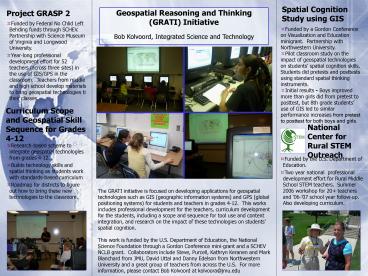Geospatial Reasoning and Thinking - PowerPoint PPT Presentation
Title:
Geospatial Reasoning and Thinking
Description:
Geospatial Reasoning and Thinking (GRATI) Initiative Bob Kolvoord, Integrated Science and Technology Project GRASP 2 Spatial Cognition Study using GIS – PowerPoint PPT presentation
Number of Views:57
Avg rating:3.0/5.0
Title: Geospatial Reasoning and Thinking
1
Geospatial Reasoning and Thinking (GRATI)
Initiative Bob Kolvoord, Integrated Science and
Technology
Project GRASP 2
Spatial Cognition Study using GIS
- Funded by Federal No Chlid Left Behding funds
through SCHEV. Partnership with Science Museum
of Virginia and Longwood University. - Year-long professional development effort for 52
teachers (across three sites) in the use of
GIS/GPS in the classroom. Teachers from middle
and high school develop materials to bring
geospatial technologies ti their classes.
- Funded by a Gordon Conference on Visualization
and Education minigrant. Partnership with
Northwestern University. - Pilot classroom study on the impact of geospatial
technologies on students spatial cognition
skills. Students did pretests and posttests
using standard spatial thinking instruments. - Initial results - Boys improved more than girls
did from pretest to posttest, but 8th grade
students use of GIS led to similar performance
increases from pretest to posttest for both boys
and girls.
Curriculum Scope and Geospatial Skill Sequence
for Grades 4-12
National Center for Rural STEM Outreach
- Research-based scheme to integrate geospatial
technologies from grades 4-12. - Builds technology skills and spatial thinking as
students work with standards-based curriculum - Roadmap for districts to figure out how to bring
these new technologies to the classroom.
- Funded by the U.S. Department of Education.
- Two year national professional development
effort for Rural Middle School STEM teachers.
Summer 2006 workshop for 20 teachers and 06-07
school year follow-up. Also developing
curriculum.
The GRATI initiative is focused on developing
applications for geospatial technologies such as
GIS (geographic information systems) and GPS
(global positioning systems) for students and
teachers in grades 4-12. This works includes
professional development for the teachers,
curriculum development for the students,
including a scope and sequence for tool use and
content integration, and research on the impact
of these technologies on students spatial
cognition. This work is funded by the U.S.
Department of Education, the National Science
Foundation through a Gordon Conference mini-grant
and a SCHEV NCLB grant. Collaborators include
Steve, Purcell, Kathryn Keranen and Mark
Blanchard from JMU, David Uttal and Danny Edelson
from Northwestern University and a great group of
teachers from across the U.S. For more
information, please contact Bob Kolvoord at
kolvoora_at_jmu.edu































